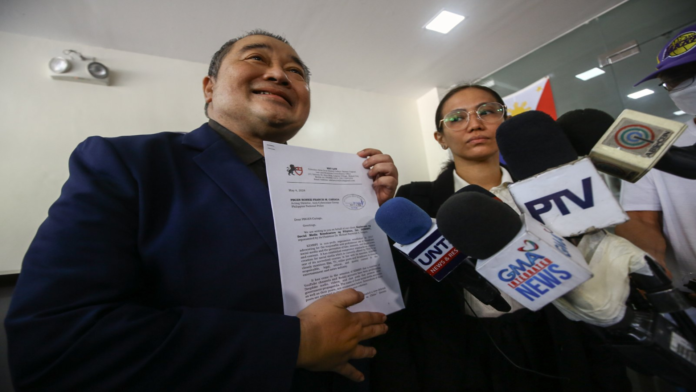A group on Tuesday filed a complaint before the Philippine National Police – Anti Cybercrime Group (PNP-ACG) against alleged perpetrators of social media videos manipulated using deepfake technology, which has also victimized President Ferdinand R. Marcos Jr.
Michael Raymond Aragon, chairperson of the Kapisanan ng Social Media Broadcasters ng Pilipinas, Inc. (KSMBPI), together with lawyer Anna Tan, led the filing of the complaint for violation of Article 154 (unlawful use of means of publication and unlawful utterances) of the Revised Penal Code in relation to Republic Act 10175 or the Cybercrime Prevention Act of 2012 against five personalities, which they did not identify.
Deepfakes are an advanced form of digital content manipulation through generative artificial intelligence (AI), where a person in an image or video is swapped with another person’s likeness.
“Meron kaming mga pinangalanan doon sa (We have respondents in our) complaint. We have websites at inaayos na namin ito (we are organizing these) and we are open to collaborating with any government agencies para maayos (so we can settle this). Maraming sites kasi sa isang site, so naka-cluster siya (There are many sites within a site so these are clustered) so more or less four to five initially (personalities),” Aragon told reporters after the filing of the complaint at the PNP-ACG office in Camp Crame.
He also said the group would ask Congress to craft a law creating a national social media regulatory board.
“We see a clear and present danger right now for the nation for our democracy. That’s why we are doing this and we would like the government to be with us. Because this is a technology na hindi alam ng tao na meron palang ganyan so nape-peke sila (Because this is a technology people are unaware of, they don’t know that they are being victimized), then the tendency is to believe but beyond this pamemeke (act of faking), what I am saying is there is a clear and present danger (in) the technology of embedded algorithm,” Aragon explained.
Tan, meanwhile, said it is high time to crack down on this “abuse of the right to freedom of speech.”
“Ang ginagamit ngayon ay artificial technology or AI, gumagawa ng deepfake ng mukha, kunwari sinabi ng Presidente, ganitong opisyales na kung sa pangkaraniwang tao maniniwala kayo na siya talaga ang nagsabi. Ngayon hindi muna natin ma-disclose yung social media accounts and moderators dahil nga ongoing pa lang yung filing (They are using AI to make deepfake faces. They make it appear that the President or any other official made such remarks. Ordinary people would believe these if they see it. We cannot disclose the social media accounts and moderators yet because the filing is ongoing),” she added.
Meanwhile, PNP-ACG Cyber Response Unit chief Col. Jay Guillermo said the group’s complaint would undergo initial verification.
“Pag-aaralan pa yan ng imbestigador namin (Our investigators would study that and they have lawyers there) and we explained what are the requirements needed for the filing, in case we can identify the persons behind the deepfake audio,” Guillermo said in a phone interview.
A deepfake video with a voice resembling that of the President, directing the Armed Forces of the Philippines to act against a particular foreign country, earlier circulated on social media.
Based on their initial investigation, Guillermo said they have identified an IP address but not the perpetrators as these are using a proxy server or a virtual private network, which is seen in other countries.
The procedures take a bit longer because the IP address does not point to the exact culprit, he said, adding that identifying the person using an IP address is the very challenging part of the investigation as it would take months for law enforcement to identify who it is.
Cybercriminals may face charges for violating Article 154 of the Revised Penal Code, in connection with Section 6 and Section 4 (b) (3) of the Cybercrime Prevention Act of 2012. (PNA)


